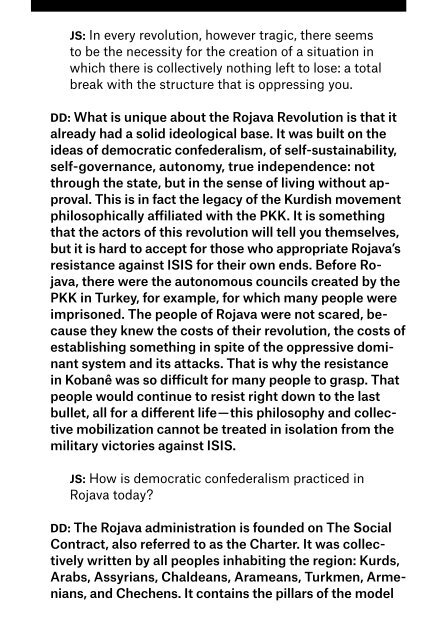Stateless Democracy
NWA5-Stateless-Democracy1.pdf?utm_content=buffer7beda&utm_medium=social&utm_source=twitter
NWA5-Stateless-Democracy1.pdf?utm_content=buffer7beda&utm_medium=social&utm_source=twitter
Create successful ePaper yourself
Turn your PDF publications into a flip-book with our unique Google optimized e-Paper software.
JS: In every revolution, however tragic, there seems<br />
to be the necessity for the creation of a situation in<br />
which there is collectively nothing left to lose: a total<br />
break with the structure that is oppressing you.<br />
DD: What is unique about the Rojava Revolution is that it<br />
already had a solid ideological base. It was built on the<br />
ideas of democratic confederalism, of self-sustainability,<br />
self-governance, autonomy, true independence: not<br />
through the state, but in the sense of living without approval.<br />
This is in fact the legacy of the Kurdish movement<br />
philosophically affiliated with the PKK. It is something<br />
that the actors of this revolution will tell you themselves,<br />
but it is hard to accept for those who appropriate Rojava’s<br />
resistance against ISIS for their own ends. Before Rojava,<br />
there were the autonomous councils created by the<br />
PKK in Turkey, for example, for which many people were<br />
imprisoned. The people of Rojava were not scared, because<br />
they knew the costs of their revolution, the costs of<br />
establishing something in spite of the oppressive dominant<br />
system and its attacks. That is why the resistance<br />
in Kobanê was so difficult for many people to grasp. That<br />
people would continue to resist right down to the last<br />
bullet, all for a different life — this philosophy and collective<br />
mobilization cannot be treated in isolation from the<br />
military victories against ISIS.<br />
JS: How is democratic confederalism practiced in<br />
Rojava today?<br />
DD: The Rojava administration is founded on The Social<br />
Contract, also referred to as the Charter. It was collectively<br />
written by all peoples inhabiting the region: Kurds,<br />
Arabs, Assyrians, Chaldeans, Arameans, Turkmen, Armenians,<br />
and Chechens. It contains the pillars of the model<br />
of democratic confederalism, a secular model of politics<br />
that guarantees gender equality, upholds the principles<br />
of social communalist, collectivist practice, meaning that<br />
centralized powers are reduced to a minimum, and that<br />
local communities, the grassroots components, uphold<br />
maximum political agency. The three cantons of Rojava<br />
— Afrîn, Cizîre, and Kobanê — are affiliated, but they<br />
organize their affairs autonomously. One of the principles<br />
is that each region will understand its realities best.<br />
Kobanê, for example, is mostly inhabited by Kurds, while<br />
Cizîre has a very multiethnic population.<br />
Each canton has 22 ministries; each ministry has one<br />
minister and two deputies. If the minister is Kurdish, then<br />
the two deputy chairs must be filled by one Arab and one<br />
Assyrian — and at least one of them has to be a woman.<br />
Each canton is chaired by one woman and one man.<br />
Parallel to the cantons is a social movement called TEV-<br />
DEM, the Movement for a Democratic Society. Their task<br />
is to link the administration and the people, to guarantee<br />
that the grassroots assume a leading role in all matters.<br />
In spite of the canton administrations, which were regarded<br />
as necessary measures to address several geopolitical<br />
threats during this transitional moment, Rojava<br />
is essentially run by councils — neighborhood councils,<br />
village councils, and city councils — where people make<br />
decisions together and form committees to implement<br />
these decisions. It is important to know that the administrative<br />
body of Rojava is not separate from civil society:<br />
that is what the Rojava revolution tries to do, to reshape<br />
governance into a collective issue.<br />
The women’s movement is also autonomously organized<br />
in the form of the coordinating body Yekîtiya Star, of<br />
which the YPJ is a part. Yekîtiya Star decides on women’s<br />
48–49


